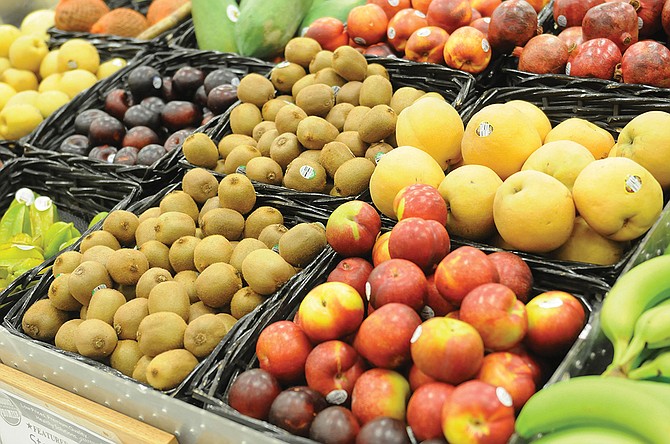Supporting local farmers is a good way to practice sustainability in eating and grocery shopping. Photo courtesy Flickr/armymedicine
Farm-to-table is a noble concept, but registered dietitian nutritionist Felicia Stoler says what goes on inside your home is as important as what happens at farms and food manufacturing facilities. "Everyone talks about sustainability, but what does that mean? We can all take more responsibility by making simple changes. Some of these tips may even save you money," she says.
Stoler says that we can all practice more sustainable eating at three places: the supermarket, our kitchens, and in our refrigerators and freezers. Here are her tips.
At the Supermarket
Bring your own bags. "Recycle the plastic bags or use canvas bags," Stoler says.
Buy only what you need. "... Don't go to the supermarket when you're hungry, or you'll be more tempted to over-buy. Likewise, be cautious about buying in bulk from one of the popular superstores," she says.
Support your local farmers whenever possible. "If their farms go out of business, they'll probably become homes, shopping centers and office buildings," she says. "Think about the economic cost and carbon footprint if that happens."
Buy produce when it's in season. "In-season fresh fruits and vegetables are at their peak flavor," she says. "Plus, they're typically dirt cheap, so you can probably afford to buy extra and freeze them for later."
Leave the cheap, processed foods on the shelf. "If you don't, you'll pay later at the cost of your family's health and the environment," she says. "It truly is a matter of pay a little more now or a lot more later."
Know when to ignore the hype. “Some perfectly fine ingredients have an undeserved reputation,” she says. “For example, you’re going to see palm oil on a lot more product labels because it’s a healthier alternative to trans fats. Some people would have you believe that palm oil production is causing deforestation and killing off animals. The truth is that most of our palm oil comes from Malaysia, where it is sustainably sourced and manufactured. The truth is that if you boycott palm oil, there would be more soy-, rapeseed- (canola) and sunflower-oil production. These all use more resources than palm. Plus, when you examine land usage for food cultivation, you’ll find that beef and soybeans cause more environmental destruction than palm.”
In Your Kitchen
Practice "first in/first out." "As you unpack groceries, put new products in the back and move older items to the front of our refrigerator or pantry," she says. "You'll be more likely to use up the older items before they expire."
Resist the urge to fill your plate. "Start with smaller servings. You can always go back for more," she says. "By reducing your portion sizes, you may discover you're not tossing as much uneaten food into the trash."
Clean up cooking messes with cloth towels instead of paper. "You'll contribute less waste to your local landfill," she says.
Have a plan for leftover ingredients. "If a recipe calls for a half cup of something, and the smallest container contains one cup, plan ahead for how you will use the remainder in a different dish," she says.
Use everything in your vegetable drawer. "I travel a lot. Before I leave town, I cook and freeze everything in my vegetable drawer so I'm not throwing it out when I get home," she says. "I make soups and stews with whatever's left in the refrigerator. I'm not good at remembering to label things, so I often have no idea what I'm defrosting for dinner. I also freeze my fruit, so I nearly always have something on hand for smoothies."
Trust your nose instead of the expiration dates. "Most foods stay fresh for several days past their use-by date if they are stored properly," she says. "If it smells okay and looks okay, it will probably be fine."
Have a use-it-up meal once a week. "Challenge your creativity. A hodgepodge meal can be a fun way to invent new food combinations," she says. "It's also a great way to keep ingredients from getting hidden and overlooked in your pantry."
Dr. Felicia D. Stoler is a registered dietitian, nutritionist, exercise physiologist, and expert consultant in nutrition and healthful living.


